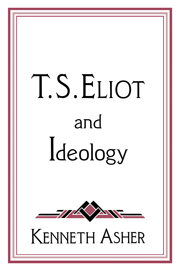3 - Orthodoxy and Heresy
Published online by Cambridge University Press: 05 June 2012
Summary
Having rejected Babbitt's humanism, which at best was available only to the few, and having overhauled Maurras's classicism, which was arbitrary at crucial points, Eliot emerges in the thirties as what, in a certain sense, he always had threatened to become – a full-fledged mythologist, endeavoring to propagate a consistent set of beliefs capable of shaping an ethos. Obvious tendencies in this direction were clearly apparent in The Waste Land, where he had cobbled together a mythic structure for his poem from pieces of Frazer, Jesse Weston, the Bible, the myth of Tiresias, and the Upanishads. And in the following year, 1923, he suggests that Joyce's turn to mythology in Ulysses points the way for any artist of the future who would organize the modern chaos:
In using the myth, in manipulating a continuous parallel between contemporaneity and antiquity, Mr. Joyce is pursuing a method which others must pursue after him. They will not be imitators, any more than the scientist who uses the discoveries of an Einstein in pursuing his own, independent, further investigations. It is simply a way of controlling, of ordering, of giving a shape and a significance to the immense panorama of futility and anarchy which is contemporary history.
But Eliot's interest in an overarching metaphysic that would be prior to the plurality of experience can be dated at least as early as his encounter in 1911 or shortly thereafter with the work of F. H. Bradley, subsequently the topic of his doctoral dissertation (1916).
- Type
- Chapter
- Information
- T. S. Eliot and Ideology , pp. 60 - 83Publisher: Cambridge University PressPrint publication year: 1995



